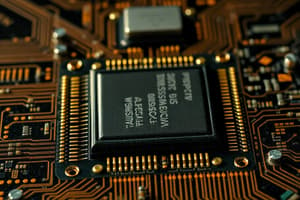Podcast
Questions and Answers
What is the purpose of dereferencing a pointer in C?
What is the purpose of dereferencing a pointer in C?
- To manipulate array elements indirectly
- To declare a pointer that points to an array
- To access the data stored at the memory location being pointed to (correct)
- To allocate memory dynamically
What is a pointer in computer science?
What is a pointer in computer science?
- A variable that represents a loop in programming
- A variable that holds the memory address of another variable (correct)
- A variable that is used to perform arithmetic operations
- A variable that directly stores a value
In the context of arrays, why are pointers useful?
In the context of arrays, why are pointers useful?
- To access array elements directly
- To store the size of the array
- To perform dynamic memory allocation
- To manipulate array elements indirectly (correct)
How is a pointer declared in C?
How is a pointer declared in C?
What happens when a pointer pointing to an array is incremented in C?
What happens when a pointer pointing to an array is incremented in C?
What does the & symbol do when working with pointers?
What does the & symbol do when working with pointers?
Which programming languages commonly use pointers?
Which programming languages commonly use pointers?
Which function is used for dynamic memory allocation in C?
Which function is used for dynamic memory allocation in C?
What is the role of pointers in dynamic memory allocation?
What is the role of pointers in dynamic memory allocation?
What is the role of a pointer in programming?
What is the role of a pointer in programming?
Why are pointers considered versatile tools in computer science?
Why are pointers considered versatile tools in computer science?
In the given code snippet, what does '*my_int_pointer += 1;' achieve?
In the given code snippet, what does '*my_int_pointer += 1;' achieve?
Flashcards are hidden until you start studying
Study Notes
Pointers in Computer Science for Second PUC Students
As you delve deeper into the world of computer science, you'll encounter the concept of pointers. Pointers play a crucial role in many programming scenarios, particularly in C and C++, but they're also found in lower-level languages like assembly. In this article, we'll explore what pointers are, how they work, and their applications in a casual and educational manner, targeted for Second PUC students.
Pointers: A Definition
A pointer is a variable that holds the memory address of another variable. This address allows you to access or manipulate the original variable indirectly. Pointers are often compared to addresses, though an address is simply a number indicating the memory location, while a pointer is a variable holding that address.
Declaring and Using Pointers
To declare a pointer in C, you use the * symbol before the variable name. For example, if you want to create a pointer to an integer, you'd write int *my_int_pointer;. You can assign the address of a variable to this pointer using the & symbol, like this: my_int_pointer = &some_int;.
Here's an example of using a pointer to increment an integer:
#include <stdio.h>
int main() {
int some_int = 5;
int *my_int_pointer = &some_int;
*my_int_pointer += 1;
printf("%d\n", some_int);
return 0;
}
In this example, we declare a pointer called my_int_pointer that points to the some_int variable. When we increment the value stored in the pointer using the * operator, the some_int variable is actually modified.
Dereferencing Pointers
The * symbol used to declare a pointer can also be used to access the data stored at the memory location being pointed to. This operation is called dereferencing. In the example above, *my_int_pointer refers to the value stored in the memory location pointed to by my_int_pointer.
Pointers and Arrays
Pointers are particularly useful when working with arrays because they allow us to manipulate array elements indirectly. To declare a pointer that points to the first element of an array, you can use the following syntax: type *name_of_pointer_array = array_name;. For example:
#include <stdio.h>
int main() {
int some_array[] = {1, 2, 3, 4, 5};
int *some_pointer_array = some_array;
printf("%d\n", *some_pointer_array);
some_pointer_array++;
printf("%d\n", *some_pointer_array);
return 0;
}
In this example, some_pointer_array points to the first element of some_array. Incrementing the pointer by one advances it to the next element.
Pointers and Dynamic Memory Allocation
Along with arrays, pointers are essential for dynamic memory allocation, where you request memory at runtime and use pointers to access that memory. In C, you can allocate memory using the malloc() function and manipulate it using pointers.
#include <stdio.h>
#include <stdlib.h>
int main() {
int *some_int_ptr = (int *)malloc(sizeof(int));
*some_int_ptr = 5;
printf("%d\n", *some_int_ptr);
free(some_int_ptr);
return 0;
}
In this example, we dynamically allocate a single integer using malloc() and store its address in the some_int_ptr pointer.
Pointers are versatile tools in computer science that can be used in various scenarios. They are integral to mastering lower-level languages and understanding memory management. As you further explore computer science, you will continue to discover new and exciting uses for pointers.
Studying That Suits You
Use AI to generate personalized quizzes and flashcards to suit your learning preferences.




